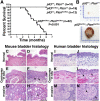Inactivation of p53 and Pten promotes invasive bladder cancer
- PMID: 19261747
- PMCID: PMC2661614
- DOI: 10.1101/gad.1772909
Inactivation of p53 and Pten promotes invasive bladder cancer
Abstract
Although bladder cancer represents a serious health problem worldwide, relevant mouse models for investigating disease progression or therapeutic targets have been lacking. We show that combined deletion of p53 and Pten in bladder epithelium leads to invasive cancer in a novel mouse model. Inactivation of p53 and PTEN promotes tumorigenesis in human bladder cells and is correlated with poor survival in human tumors. Furthermore, the synergistic effects of p53 and Pten deletion are mediated by deregulation of mammalian target of rapamycin (mTOR) signaling, consistent with the ability of rapamycin to block bladder tumorigenesis in preclinical studies. Our integrated analyses of mouse and human bladder cancer provide a rationale for investigating mTOR inhibition for treatment of patients with invasive disease.
Figures




Comment in
-
Bladder cancer: modeling and translation.Genes Dev. 2009 Mar 15;23(6):655-9. doi: 10.1101/gad.1789109. Genes Dev. 2009. PMID: 19299556
References
-
- Bjornsti M.A., Houghton P.J. The TOR pathway: A target for cancer therapy. Nat. Rev. Cancer. 2004;4:335–348. - PubMed
-
- Cairns P., Evron E., Okami K., Halachmi N., Esteller M., Herman J.G., Bose S., Wang S.I., Parsons R., Sidransky D. Point mutation and homozygous deletion of PTEN/MMAC1 in primary bladder cancers. Oncogene. 1998;16:3215–3218. - PubMed
Publication types
MeSH terms
Substances
Grants and funding
LinkOut - more resources
Full Text Sources
Medical
Molecular Biology Databases
Research Materials
Miscellaneous
